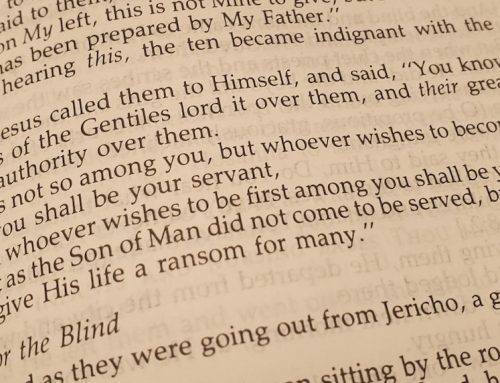Why won’t anyone call the “November Meeting” the “Thanksgiving Meeting?”
Oh, that’s right, because Christians don’t celebrate “religious holidays.” Birthdays…fine. Anniversaries…fine. Nothing spiritual there. But a holiday with a spiritual component to it? We can’t have that!
Logically and Biblically, this is nothing short of absurd, of course. I’ll get to the scriptures in a moment, but think about how silly this rule of men is. We can choose to set aside a time to honor the day God brought a person into the world, or the day God joined a couple together in “holy matrimony” (remember, marriage is not just a social institution, but a religious one created by God). But we can’t set aside a time as a nation, as a society, as a family, or even as an individual to give thanks to our Creator for all things? Really? Here we go again:
Matthew 15:9 But in vain they do worship me, teaching for doctrines the commandments of men.
I don’t know whether the church actively teaches people to stop joining their families for Thanksgiving dinners or not. I do know they’ve effectively eliminated that tradition from the “strong” members who choose to go to a “November Meeting” in their respective part of the country. But maybe–just maybe–the ones who go to such meetings are the weak ones, and the ones who stay home with their families for the Thanksgiving holiday are actually the stronger ones. Let me explain.
The main passage given to support this supposed prohibition against keeping holidays is this one:
Galatians 4:9-11 – But now, after that ye have known God, or rather are known of God, how turn ye again to the weak and beggarly elements, whereunto ye desire again to be in bondage? 10 Ye observe days, and months, and times, and years. 11 I am afraid of you, lest I have bestowed upon you labour in vain.
OK, fair enough. But if we take this at face value, this seems to be a prohibition against observing any days, and months , and times, and years, doesn’t it? So let’s look at that all-important context to figure out what Paul is actually saying to the Galatian church.
This entire chapter, if you read it, is a warning to the Galatian church not to enslave themselves to the Old Law and all of its trappings, such as binding the keeping of days, and months, and times and years as religious duties. That’s right. It’s about warning them against those who were trying to suck them back into the idea that Christians must observe things like the Sabbath, Pentecost, Purim, and others Jewish holidays.
Paul had no problem with people setting aside days for whatever spiritual purpose they want. It’s binding those holidays on themselves and others as a mandatory thing for one’s salvation that is he warning against, because that’s exactly what certain teachers in the Galatian church were trying to do.
How do I know this? Again, read the whole chapter, then take a look at these verses in particular:
Galatians 4:17 – Those people are zealous to win you over, but for no good. What they want is to alienate you from us, so that you may have zeal for them. NIV
Galatians 4:21 – Tell me, you who want to be under the law, are you not aware of what the law says? NIV
Galatians 4:26 – But the Jerusalem that is above is free, and she is our mother. NIV
Galatians 4:31 – Therefore, brothers and sisters, we are not children of the slave woman, but of the free woman. NIV
The context here in Galatians is clearly one of liberty from the Law, not the creation of a new law, either prohibiting or requiring any particular holidays.
Adding to our knowledge of this subject that it’s one of liberty, not law, are Paul’s words to the church in Colosse. First, I recommend reading the whole second chapter of Colossians, then take a look at this:
Colossians 2:8 – See to it that no one takes you captive through hollow and deceptive philosophy, which depends on human tradition and the elemental spiritual forces of this world rather than on Christ. NIV
Again, we see the idea that he’s teaching against “captivity” or binding traditions on people. Sounds an awful lot like binding the tradition that we can’t have a spiritual tradition, doesn’t it?
Colossians 2:16 – Therefore do not let anyone judge you by what you eat or drink, or with regard to a religious festival, a New Moon celebration or a Sabbath day. NIV
Wait a minute! Don’t let anyone judge you with regard to religious holidays? That’s not what Stanton teaches, is it? They’ll be quick to point out the context that Jewish Christians were judging the Gentile ones for NOT celebrating the Jewish holidays, but remember, he words this very generally to apply to both camps: Don’t let anyone judge you “with regard to a religious festival.”
The chapter wraps up with these words:
Colossians 2:0 Since you died with Christ to the elemental spiritual forces of this world, why, as though you still belonged to the world, do you submit to its rules? 21 “Do not handle! Do not taste! Do not touch!”? 22 These rules, which have to do with things that are all destined to perish with use, are based on merely human commands and teachings. 23 Such regulations indeed have an appearance of wisdom, with their self-imposed worship, their false humility and their harsh treatment of the body, but they lack any value in restraining sensual indulgence. NIV
Paul’s been very consistent. The problem he was writing about was the Jewish converts’ desire to impose their holidays as requirements, but his admonition is to stop making human rules and regulations altogether.
The clincher is Paul’s instruction to the church in Rome. The context is a church that was divided over different opinions. Some thought a Christian couldn’t eat meat offered to idols. Another believed you could. Some celebrated holidays. Others believed that was wrong. Read the chapter, then take a look at these passages:
Romans 14:1-6 – Accept the one whose faith is weak, without quarreling over disputable matters. 2 One person’s faith allows them to eat anything, but another, whose faith is weak, eats only vegetables. 3 The one who eats everything must not treat with contempt the one who does not, and the one who does not eat everything must not judge the one who does, for God has accepted them. 4 Who are you to judge someone else’s servant? To their own master, servants stand or fall. And they will stand, for the Lord is able to make them stand.
5 One person considers one day more sacred than another; another considers every day alike. Each of them should be fully convinced in their own mind. 6 Whoever regards one day as special does so to the Lord. Whoever eats meat does so to the Lord, for they give thanks to God; and whoever abstains does so to the Lord and gives thanks to God. NIV
Wow. This is completely contrary to Stanton’s teaching, isn’t it? Isn’t this the exact situation we’re talking about regarding Thanksgiving or other “religious holidays?” “One person considers one day more sacred than other; another considers every day alike. Each of them should be fully convinced in their own mind.“
Can I just repeat that for emphasis?
“Each of them should be fully convinced in their own mind.”
And then there’s this:
Romans 14:10 – You, then, why do you judge your brother or sister? Or why do you treat them with contempt? For we will all stand before God’s judgment seat. NIV
And this:
Romans 14:12-14 – So then, each of us will give an account of ourselves to God.
13 Therefore let us stop passing judgment on one another. Instead, make up your mind not to put any stumbling block or obstacle in the way of a brother or sister. 14 I am convinced, being fully persuaded in the Lord Jesus, that nothing is unclean in itself. But if anyone regards something as unclean, then for that person it is unclean. NIV
And my favorite:
Romans 14:22 – So whatever you believe about these things keep between yourself and God. NIV
This resonates with a great quote from Alexander Campbell:
But men cannot give up their opinions, and therefore, they can never unite, says one. We do not ask them to give up their opinions–we ask them only not to impose them upon others. Let them hold their opinions, but let them hold them as private property. ~Alexander Campbell
This is a hard one, because obviously Paul didn’t keep his opinion about this entirely to himself. He wrote a substantial portion of his letter about it. But it’s important to note that the opinion he felt compelled to share was not whether a particular holiday was right or wrong, or that one particular group advocating their opinion was right or wrong, but that Christians ought to extend grace to their brothers and let them form their own private opinions about it. In the meantime, try not to cause a brother to stumble, of course. So tread carefully, and in all things, love one another.
Whatever one feels about holidays in general, or Thanksgiving in particular, I think it’s safe to say that Paul’s exhortation to Thessalonian church still stands:
1 Thessalonians 5:16-18 – Rejoice always, pray continually, give thanks in all circumstances; for this is God’s will for you in Christ Jesus.
Happy Thanksgiving, everyone, and may we each spend it giving thanks to God for our many blessings, not just for turkey, friends and family.
And greetings to my friends attending any of the Thanksgiving Meetings around the country.






Awesome and very thought provoking blog, Kevin. You brought up several scriptures I have been studying and your insight is excellent!
Thanks Karen! Have a good Thanksgiving and say hi to everyone. 🙂
I agree Kevin. How I see this is the way it is written in the Old Testament. Isaiah 1:12-14 When ye come to appear before me, who hath required this at your hand, to tread my courts? Bring no more vain oblations; incense is an abomination unto me; the new moons and sabbaths, the calling of assemblies, I cannot away with; it is iniquity, even the solemn meeting. Your new moons and your appointed feasts my soul hateth: they are a trouble unto me; I am weary to bear them. We can't have "holidays" in God's name like Christmas. Christmas… Read more »